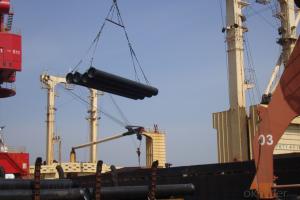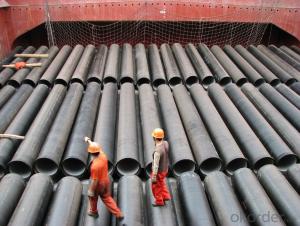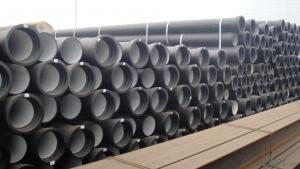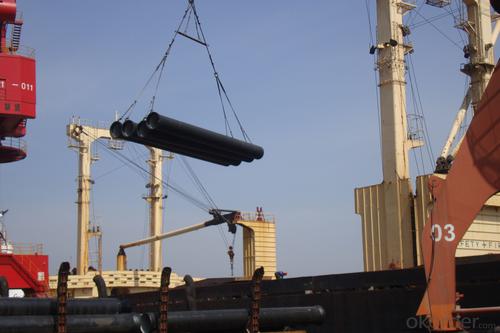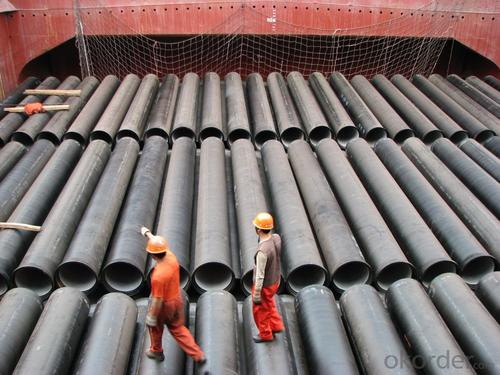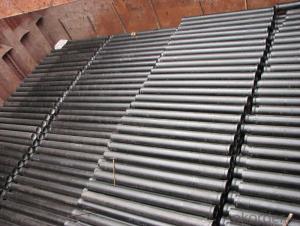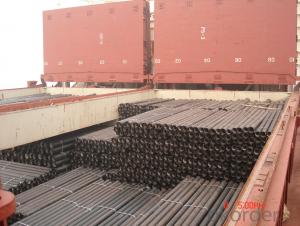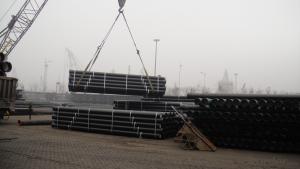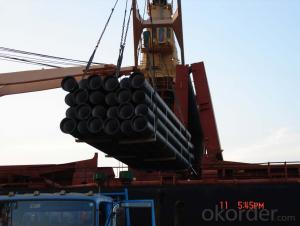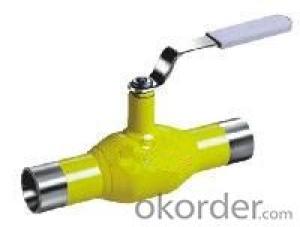Ductile Iron Pipe On Sale From China with Cheap Top Quality
- Loading Port:
- Tianjin
- Payment Terms:
- TT OR LC
- Min Order Qty:
- 50 pc
- Supply Capability:
- 5000 pc/month
OKorder Service Pledge
OKorder Financial Service
You Might Also Like
1. hydraulic hose crimping machine in Electrical equipment&supplies
Specifications
High pressure hose to the winding wire matrix, skin coated refractory coating layer steel braided flame retardant layer
APPLICATIONS:It is mainly used in high temperature surroundings and in conditions having heat source or heat radiation source,such as oil field well-control,metal smelt,and chemical industry.
Inner Diameter of Hose mm | Inside Diameter | Reinforcement Diameter (mm) | Outside Diameter (mm) | Work Pressure (MPa) | Proof Pressure (MPa) | Minimum Explosive Pressure (MPa) | Minimum Bending Radius mm | Refractory °C | |||
Mpa | Psi | MPa | Psi | Mpa | Psi | ||||||
φ13(1/2") | 13±0.5 | 22.2±0.8 | 44±1.06 | 43 | 6230 | 64.5 | 9435 | 86 | 12460 | 230 | 750 |
φ16(5/8") | 16±0.5 | 26±0.8 | 47±1.5 | 38 | 5506 | 57 | 8259 | 76 | 11012 | 260 | 750 |
φ19(3/4") | 19±0.5 | 30±0.8 | 52±1.5 | 34.5 | 4999 | 51.75 | 7498 | 69 | 9998 | 300 | 750 |
φ25(1") | 25±0.8 | 36±0.8 | 59±1.5 | 27.5 | 3984 | 41.25 | 5976 | 55 | 7968 | 360 | 750 |
φ32(5/4") | 32±0.8 | 44±0.8 | 69±2.0 | 20.5 | 2970 | 30.75 | 4455 | 41 | 5940 | 470 | 750 |
φ38(3/2") | 38±1.0 | 76±2.0 | 87.2±5.1 | 17 | 2463 | 25.5 | 3694 | 34 | 4926 | 570 | 750 |
φ51(2") | 51±1.0 | 91±2.0 | 100.7±5.1 | 17 | 2463 | 25.5 | 3695 | 34 | 4926 | 740 | 750 |
2. Antiflaming,fire-resistance rubber hose assembly
Specifications
High pressure hose to the winding wire matrix, skin coated refractory coating layer steel braided flame retardant layer and laye
APPLICATIONS:It is mainly used in high temperature surroundings and in conditions having heat source or heat radiation source,such as oil field well-control,metal smelts,and chemical industry
Inner Diameter of Hose mm | Inside Diameter | Reinforcement Diameter (mm) | Outside Diameter (mm) | Work Pressure (MPa) | Proof Pressure (MPa) | Minimum Explosive Pressure (MPa) | Minimum Bending Radius mm | Refractory °C | |||
Mpa | Psi | MPa | Psi | Mpa | Psi | ||||||
φ13(1/2") | 13±0.5 | 22.2±0.8 | 44±1.06 | 43 | 6230 | 64.5 | 9435 | 86 | 12460 | 230 | 750 |
φ16(5/8") | 16±0.5 | 26±0.8 | 47±1.5 | 38 | 5506 | 57 | 8259 | 76 | 11012 | 260 | 750 |
φ19(3/4") | 19±0.5 | 30±0.8 | 52±1.5 | 34.5 | 4999 | 51.75 | 7498 | 69 | 9998 | 300 | 750 |
φ25(1") | 25±0.8 | 36±0.8 | 59±1.5 | 27.5 | 3984 | 41.25 | 5976 | 55 | 7968 | 360 | 750 |
φ32(5/4") | 32±0.8 | 44±0.8 | 69±2.0 | 20.5 | 2970 | 30.75 | 4455 | 41 | 5940 | 470 | 750 |
φ38(3/2") | 38±1.0 | 76±2.0 | 87.2±5.1 | 17 | 2463 | 25.5 | 3694 | 34 | 4926 | 570 | 750 |
φ51(2") | 51±1.0 | 91±2.0 | 100.7±5.1 | 17 | 2463 | 25.5 | 3695 | 34 | 4926 | 740 | 750 |
3. hydraulic hose Universal Wire-braided DN6
Quick Details
· Place of Origin: Hebei, China (Mainland)
· Brand Name: CMAX/CNBM
· Model Number: GB/T3683-92
Packaging & Delivery
Packaging Details: | hydraulic hose is wrapped with fabrics |
Delivery Detail: | 80000meters/30days |
Specifications
Universal Wire-braided Hydraulic Hose, Q/FLT01-AStandard GB/T3683-92, Temperature range: -40 to +100
Universal Wire-braided Hydraulic Hose
Q/FLT01-AStandard GB/T3683-92
Tube: oil resistant synthetic rubber
Reinforcement: 1 W/B (one high tensile steel wire braid)
Cover: abrasion and weather resistant synthetic rubber
Temperature range: -40 to +100.
4. Drilling Rubber Hose
Quick Details
· Place of Origin: Hebei, China (Mainland)
· Brand Name: CMAX/CNBM
Packaging & Delivery
Packaging Details: | Package: plastic films, then wrapped with fabrics |
Delivery Detail: | According to the Quantity |
Specifications
Drilling hose
DN |
Hose I.D | Wire O.D |
Hose O.D |
Working Pressure | Burst Pressure | Minimum Bend Radius | Weight | Length | |||
inch | mm | mm |
mm | MPa | psi | MPa | psi | mm | kg/m | metres | |
5 | 3/16 | 4.8 | 9.5 | 11.8 | 25.0 | 3630 | 100.0 | 14280 | 89 | 0.19 | 50/100 |
6 | 1/4 | 6.4 | 11.1 | 13.4 | 22.5 | 3270 | 90.0 | 12840 | 102 | 0.21 | 50/100 |
8 | 5/16 | 7.9 | 12.7 | 15.0 | 21.5 | 3120 | 85.0 | 12280 | 114 | 0.24 | 50/100 |
10 | 3/8 | 9.5 | 15.1 | 17.4 | 18.0 | 2615 | 72.0 | 10280 | 127 | 0.33 | 50/100 |
13 | 1/2 | 12.7 | 18.3 | 20.6 | 16.0 | 2320 | 64.0 | 9180 | 178 | 0.41 | 50/100 |
16 | 5/8 | 15.9 | 21.4 | 23.7 | 13.0 | 1890 | 52.0 | 7420 | 203 | 0.45 | 50/100 |
19 | 3/4 | 19.0 | 25.4 | 27.7 | 10.5 | 1530 | 42.0 | 6000 | 241 | 0.58 | 50/100 |
25 | 1 | 25.4 | 33.3 | 35.6 | 8.8 | 1280 | 35.0 | 5020 | 305 | 0.88 | 50 |
32 | 11/4 | 31.8 | 40.5 | 43.5 | 6.3 | 920 | 25.0 | 3600 | 419 | 1.23 | 20/40 |
38 | 11/2 | 38.1 | 46.8 | 50.6 | 5.0 | 730 | 20.0 | 2860 | 508 | 1.51 | 20/40 |
51 | 2 | 50.8 | 60.2 | 64.0 | 4.0 | 580 | 16.0 | 2280 | |||
5. Concrete pump rubber hose
Quick Details
· Place of Origin: Hebei, China (Mainland)
· Brand Name: CMAX/CNBM
Packaging & Delivery
Packaging Details: | Package: plastic films, then wrapped with fabrics |
Delivery Detail: | According to the Quantity |
Specifications
Specifications
High Quality Concrete Pump Delivery Rubber Hose
1.high quality
2.ISO9001:2008
3.reasonable price
1. Material: Black NR and BR synthetic rubber .
2.Reinforcement:Spiral textile/steel wire.
3. Widely application: Schwing PM SANY Zoomlion and other brand concrete pump trucks.
4.Cover:Abrasion resistantant,heat and ozone resistant.
5.Inside diameter:50-152mm
6.Working pressure:8.5 MPA.
7.Detailed specification:
No | Description | ID | OD | Plies | Working Pressure | Burst Pressure | Weight |
1 | 2 inch | 50mm | 70mm | 2 | 8.5MPA 1200PSI | 20MPA 3000PSI | 3.5kgs |
2 | 2.5 inch | 63mm | 88mm | 2 | 8.5MPA 1200PSI | 20MPA 3000PSI | 4.9kgs |
3 | 3 inch | 76mm | 102mm | 2 | 8.5MPA 1200PSI | 20MPA 3000PSI | 6.5kgs |
4 | 4 inch | 100mm | 130mm | 2 | 8.5MPA 1200PSI | 20MPA 3000PSI | 9.3kgs |
5 | 5 inch | 125mm | 155mm | 2 or 4 | 8.5MPA 1200PSI | 20MPA 3000PSI | 10.9kgs |
6 | 6 inch | 152mm | 184mm | 2 | 8.5MPA 1200PSI | 20MPA 3000PSI | 13.3kgs |
Product Description:
Place of Origin: China (Mainland)
Model Number: T type / K type / Flange type
Length: 6M/NEGOTIATED
Standard: ISO2531 and EN545
Application: Potable/Sewage Water
Diameter: DN80~DN1600
Shape: Round
Hardness: 230
Pipe Wall Thickness: STANDARD
Pull Strength: 420 Yield (≥ MPa): 300
Material: Cast Iron
Type: Ductile Iron Pipes
Certification: ISO2531 and EN545
Specification: DN80~DN1600
Outer Diameter: 80-1600
Thickness: standard
Usage: water pipe Packaging & Delivery
Packaging Details: DN80~DN300 are bundled with steel belts, others are in bulk condition.
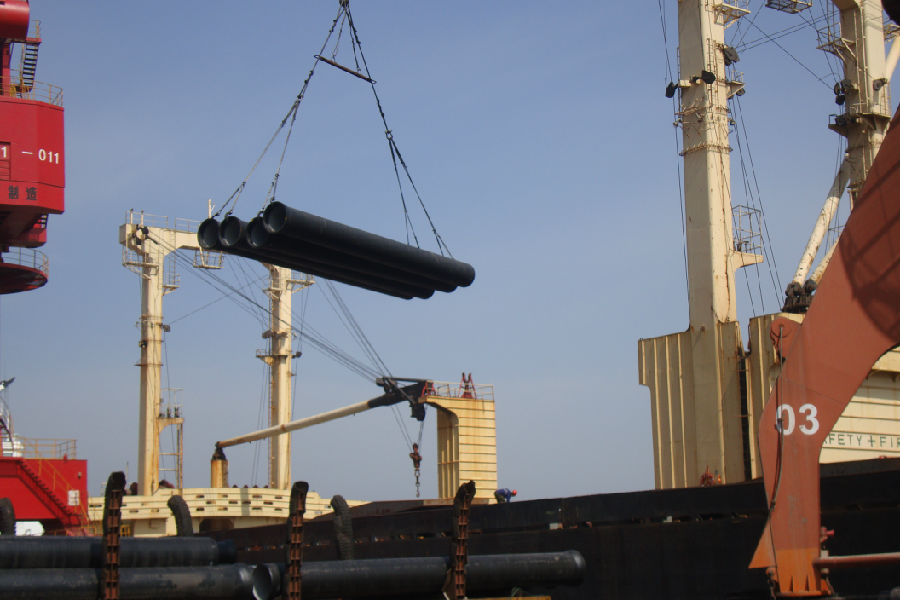
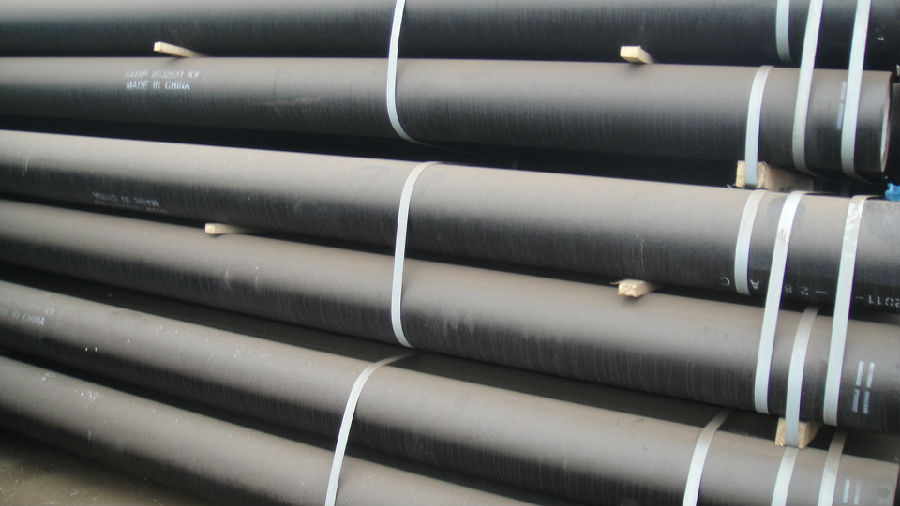
- Q: Can ductile iron pipe be used for both water and sewage applications?
- Yes, ductile iron pipe can be used for both water and sewage applications. Ductile iron pipe is known for its strength, durability, and corrosion resistance, making it suitable for a wide range of applications, including conveying both water and sewage. Its high tensile strength allows it to withstand the high pressure and heavy loads associated with water and sewage systems. Additionally, ductile iron pipe has a smooth interior surface that helps to minimize friction and improve flow efficiency, making it ideal for transporting both water and sewage. The material's resistance to corrosion and chemical attack ensures a long service life, even in harsh environments. Furthermore, ductile iron pipe is available in a variety of sizes and configurations, allowing it to be customized to meet the specific requirements of water and sewage applications. Overall, ductile iron pipe is a reliable and versatile choice for both water and sewage conveyance.
- Q: Can ductile iron pipes be used in agricultural applications?
- Yes, ductile iron pipes can be used in agricultural applications. Ductile iron pipes have excellent strength and durability, making them suitable for various agricultural purposes. They can be used for irrigation systems, water supply pipelines, and drainage systems in farms and agricultural fields. Ductile iron pipes are resistant to corrosion and have a long lifespan, which is crucial for agricultural applications where the pipes are exposed to various environmental factors and chemicals. Additionally, ductile iron pipes have the ability to withstand high-pressure water flow, making them ideal for transporting water for irrigation purposes. Overall, ductile iron pipes are a reliable and efficient choice for agricultural applications due to their strength, durability, corrosion resistance, and ability to handle high-pressure water flow.
- Q: What are the different methods for testing ductile iron pipe?
- There are several methods for testing ductile iron pipe, including visual inspection, hydrostatic pressure testing, ultrasonic testing, magnetic particle inspection, and mechanical testing.
- Q: Can ductile iron pipes be used in areas with high levels of industrial effluents?
- Yes, ductile iron pipes can be used in areas with high levels of industrial effluents. Ductile iron is a type of cast iron that has enhanced flexibility and strength, making it highly resistant to corrosion and abrasion. This makes it suitable for handling various types of industrial effluents, including those with high levels of chemicals, acids, or other corrosive substances. Ductile iron pipes have a protective lining, such as cement mortar or polyethylene, which further enhances their resistance to chemical attack. These linings prevent the effluents from coming into direct contact with the iron material, ensuring the longevity and integrity of the pipes. Moreover, ductile iron pipes have been used extensively in industrial applications where corrosive environments are present. They have proven to be durable and reliable, with a long service life, even in challenging conditions. Proper maintenance and regular inspections are essential to ensure the continued performance of ductile iron pipes in areas with high levels of industrial effluents. It is crucial to consider the specific characteristics of the effluents and consult with experts or manufacturers to determine the most suitable pipe materials and linings for the particular industrial environment.
- Q: What are the different sizes of ductile iron pipes available?
- Ductile iron pipes are available in a variety of sizes to cater to different applications and requirements. The sizes of ductile iron pipes typically range from 3 inches to 64 inches in diameter. These different sizes allow for flexibility and adaptability in various industries such as water supply, sewage systems, irrigation, and industrial piping. The smaller diameter ductile iron pipes, such as those in the range of 3 to 12 inches, are commonly used for residential and small-scale applications like household plumbing, fire hydrant systems, and small irrigation projects. These sizes are often found in urban areas and residential neighborhoods. For more extensive applications, larger diameter ductile iron pipes are utilized. They can range from 14 inches up to 64 inches in diameter. These larger pipes are predominantly used in municipal water supply systems, wastewater treatment plants, and industrial facilities where high-volume water flow is required. The availability of a wide range of sizes in ductile iron pipes ensures that they can accommodate various flow rates and pressure requirements. It allows engineers, contractors, and designers to select the appropriate size based on the specific needs of a particular project or application. It is essential to consult industry standards, local regulations, and engineering guidelines to determine the suitable size of ductile iron pipes for any specific project. This ensures that the pipes are capable of meeting the required performance standards and are suitable for the intended use.
- Q: How do ductile iron pipes handle internal scale buildup?
- Ductile iron pipes are highly resistant to internal scale buildup due to their smooth inner surface. The material's inherent strength and durability allow it to withstand the pressure exerted by scale deposits without significant damage or reduced performance. Additionally, the smooth surface of ductile iron pipes minimizes the adhesion of scale, preventing its accumulation and ensuring efficient flow of water or other fluids. Regular maintenance and periodic cleaning can further enhance the longevity and performance of ductile iron pipes in managing any potential scale buildup.
- Q: A tube is used only in ductile iron pipes, isn't it?
- Is that the nodular graphite cast iron pipe is called centrifugal ductile iron pipe, it has the properties of nature, iron and steel, excellent corrosion resistance, good ductility, good sealing effect, simple installation, mainly for municipal, industrial and mining enterprises, water supply, gas, oil etc.. Water supply pipe is the first choice, with high cost performance.
- Q: What are the different corrosion protection options for ductile iron pipe?
- To ensure the longevity and durability of ductile iron pipes, there are several options available for corrosion protection. These options are as follows: 1. Cement Mortar Lining: A layer of cement mortar is applied to the inner surface of the pipe, creating a barrier against corrosive elements in water or soil. This lining offers excellent corrosion resistance and can endure for many decades. 2. Polyethylene Encasement: The ductile iron pipe is wrapped with a layer of polyethylene material, which acts as a physical shield against external corrosive elements. This method is commonly employed in aggressive soil conditions and provides long-lasting protection. 3. Internal and External Coatings: Different types of coatings, such as epoxy, polyurethane, or fusion-bonded epoxy (FBE) coatings, can be applied to the inner and outer surfaces of the pipe to resist corrosion. These coatings form a barrier that prevents the pipe from corroding in the surrounding environment. 4. Cathodic Protection: An electrical current is utilized to safeguard the pipe from corrosion. Cathodic protection systems can be either galvanic (sacrificial anode) or impressed current systems. These systems control the flow of electrons, preventing the oxidation of the ductile iron pipe. 5. Zinc Coating: Also known as galvanizing, this method involves applying a layer of zinc to the surface of the ductile iron pipe. Zinc acts as a sacrificial anode, corroding instead of the iron pipe. Zinc coating is particularly effective in soil conditions with low resistivity, offering reliable corrosion protection. It is crucial to consider various factors such as the environment, water chemistry, soil conditions, and expected service life when choosing a corrosion protection option for ductile iron pipes. Consulting with corrosion protection specialists and engineers can assist in selecting the most suitable option for specific applications.
- Q: Are ductile iron pipes suitable for horizontal directional drilling?
- Yes, ductile iron pipes are suitable for horizontal directional drilling due to their high strength and flexibility, which allows them to withstand the stress and bending forces during the drilling process.
- Q: How are ductile iron pipes inspected for quality control?
- Ductile iron pipes are inspected for quality control through various methods such as visual inspection, hydrostatic pressure testing, dimensional checks, and non-destructive testing techniques like ultrasonic testing. These inspections ensure that the pipes meet the required specifications and standards, and any defects or abnormalities can be detected before installation or use.
Send your message to us
Ductile Iron Pipe On Sale From China with Cheap Top Quality
- Loading Port:
- Tianjin
- Payment Terms:
- TT OR LC
- Min Order Qty:
- 50 pc
- Supply Capability:
- 5000 pc/month
OKorder Service Pledge
OKorder Financial Service
Similar products
Hot products
Hot Searches
Related keywords
